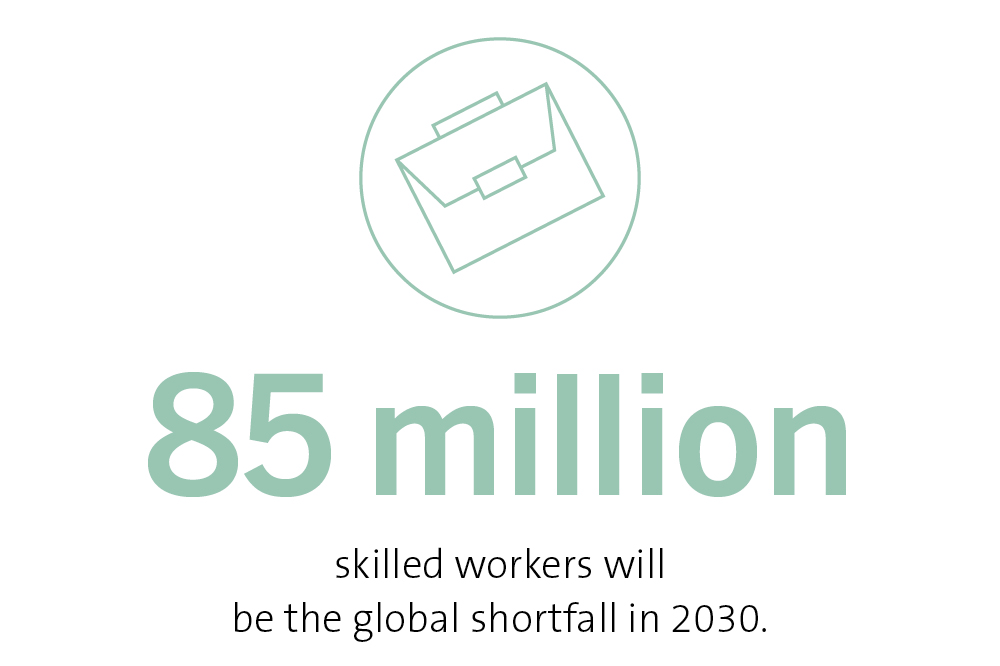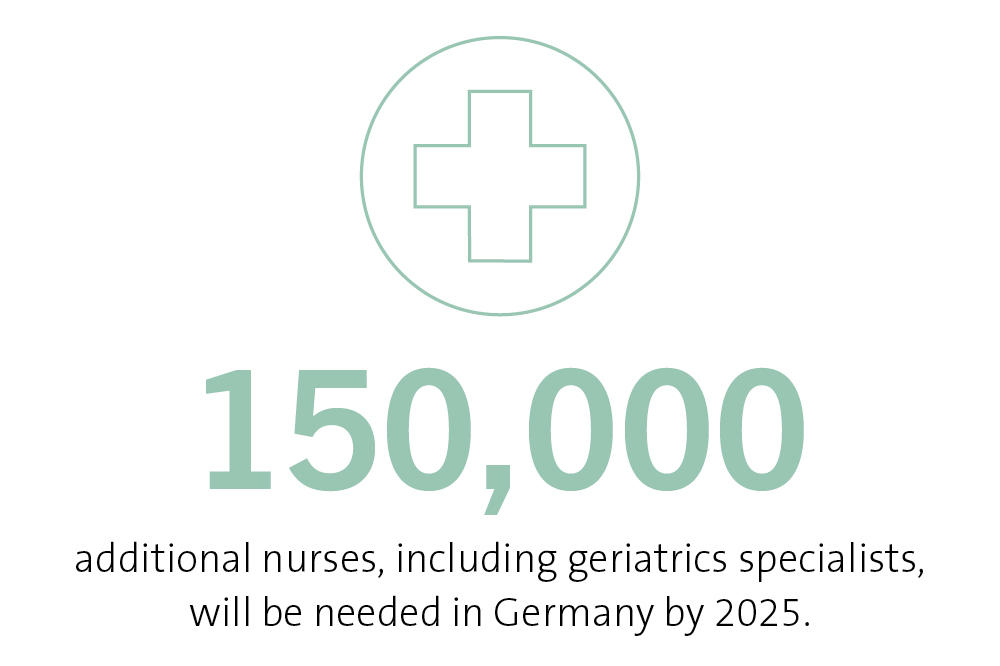Obtain news and background information about sealing technology, get in touch with innovative products – subscribe to the free e-mail newsletter.

27.07.2021 | Story
Who is Missing - and Where?
What good is state-of-the-art technology if there is no one to operate it? Well-trained skilled workers are still an economy’s most important resource despite the increased automation of work processes. And those workers are in short supply.
Bleak prospects are looming for 2030: Analysts have been warning about the global skills gap for years. A shortage of highly trained workers is going to slow technological progress, reduce prosperity and usher in a global crisis – if companies and political leaders fail to introduce countermeasures in the form of training programs and changes in the work culture. Those who are sounding the alarm present charts that show lines radiating in scissor-like patterns and age pyramids in the shape of bulging urns. There is broad agreement that a critical imbalance between supply and demand will be reached in 2030. That’s when the baby-boomer generation of Western industrial nations will have retired.
The consulting firm Korn Ferry has predicted that there will be a shortage of 85 million workers in 2030, quantifying it as $8.5 trillion in unrealized revenue. To put the problem more precisely, there is a shortage of people with the skills that match the jobs of the near future. In this light, the notion of a “scarcity of skilled workers” is imprecise – the problem is that there is a talent imbalance or mismatch. The change in perspective reveals that many people have not had the opportunity to build up the skills that prepare them for the highly specialized tasks that are increasingly in demand. Moreover, the structures of the old world of work do not meet the needs of the younger generation.
A Skills Shortage at One in Two Companies
In 2019, one company out of every two did not have enough skilled workers. The ManpowerGroup analyzed the trend in its report entitled “Closing the Skills Gap: What Workers Want”. A world map in this report shows the most affected countries in deep red: They were the United States, Japan, Taiwan and Hong Kong, along with European countries like Poland, Finland, Hungary, Romania, Croatia and Greece. Shown in lighter red, Germany, Sweden, Portugal and Slovakia were only a bit better off. Israel and New Zealand fell into the same category.
Compared to all the other countries in our study, the United States is facing an especially alarming scarcity of skilled labor.
Consulting firm Korn Ferry
“Compared to all the other countries in our study, the United States is facing an especially alarming scarcity of skilled labor,” Korn Ferry summed up in “Future of Work. The Global Talent Crunch”. This could entail a 6 percent decline in economic volume, the analysts say. In 2030, only India will have a worker surplus ranging from technical experts to factory staff. There is huge potential in Africa since a quarter of its people will be younger than 25 in 2030. Everything now depends on the educational opportunities for that generation. At present, many companies in Africa still cannot find enough qualified workers, which is why two-thirds of its CEOs are investing less than they would like.
What Expertise Is Really Lacking
The demand for skilled employees is often associated with the so-called MINT fields – mathematics, information science, natural sciences and technology, which are the foundations of the engineering professions. From the standpoint of the entire economy, this impression is deceiving. While many major studies concentrate on the technology and financial sectors, bottlenecks in the nonacademic professions that support public life go unnoticed.
A study from the ManpowerGroup offers a balanced picture. Here the skilled trades top the list of the most sought-after competencies, ahead of sales, marketing and technology. Engineers land in fourth place, and drivers and logisticians follow. IT specialists only appear in sixth place, followed by occupations such as machine operators and the building trades. For the first time, physicians and nurses have risen into the top 10 of the annual ratings.



Clinic Beds – But No Caregivers
The damage to Germany’s medical sector has been especially severe during the corona pandemic. Many intensive care beds and respirators were indeed available, but there weren’t enough intensive care nurses in these situations. Germany’s health system is considered to be one of the best in the world, but its Achilles’ heel is a shortage of nursing staff. The country, which has the second-oldest population in the world, will need about 150,000 nurses, including geriatric caregivers, by 2025. That is why they are recruited from other countries, including Mexico, Vietnam, Tunisia, Serbia, Bosnia-Herzegovina and the Philippines. Bilateral agreements are designed to prevent a brain drain since a disproportionate migration of well-trained experts weakens the home economy. But countries with demographic trends like Germany’s are dependent on the migration of workers.
The World Needs These Skills
One strong indication of the global technological change is the rising demand for certain specialists. For example, Germany is looking for engineers in mechatronics and automation. In the United States, renewable energy is increasingly important, and the demand for technicians with experience in wind turbines and solar is soaring. For its part, Saudi Arabia cannot rely on its oil reserves forever. The country has to build up its IT expertise to keep up with technological change. That means its young, mobile, networked population is its most important resource for the future. They are due to be trained in cloud computing, cybersecurity and network technology. It is also essential for the country to open up its male-dominated world of work to large numbers of well-educated women. In Japan, by contrast, a natural decline in the number of workers is accompanying the fall in its birth rate. In response, the country is automating production processes – which merely shifts the demand. Then it is app developers and experts in artificial intelligence and the Internet of Things who are sought-after. Meanwhile, China is pressing ahead with the massive digitalization of its huge industrial sector. It has its eye on the still rare specialists in artificial intelligence and blockchain along with full stack developers, the super talent among programmers. In many countries, jobs are emerging that are totally new to state employment exchanges. One thing is sure: We need a skills offensive. In the interests of business and humanity.
This article originally appeared in ESSENTIAL, Freudenberg Sealing Technologies’ corporate magazine that covers, trends, industries and new ideas.
More news on the subject Sustainability

Join Us!
Experience Freudenberg Sealing Technologies, its products and service offerings in text and videos, network with colleagues and stakeholders, and make valuable business contacts.
Connect on LinkedIn! open_in_new











